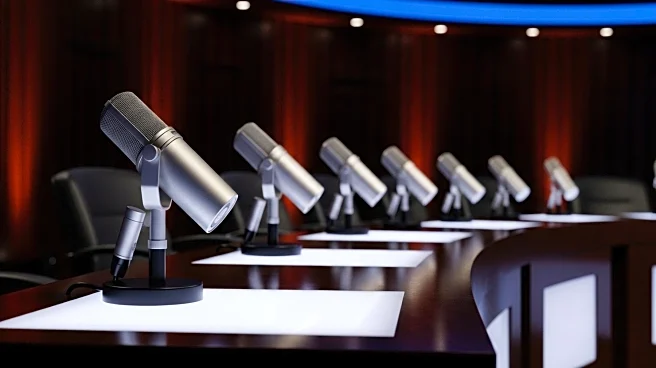What is the story about?
What's Happening?
Late-night television hosts Jon Stewart, Stephen Colbert, and Jimmy Fallon addressed the suspension of ABC host Jimmy Kimmel with a mix of humor and solidarity. Kimmel was suspended indefinitely by ABC following comments he made about the assassination of conservative activist Charlie Kirk. Stewart used satire to critique the suspension, while Colbert called it 'blatant censorship.' Fallon expressed support for Kimmel, praising him as a decent and funny individual. The suspension came after Kimmel's remarks on his show, which led to a group of ABC-affiliated stations refusing to air it. Federal Communications Commission Chairman Brendan Carr indicated that the agency might hold Kimmel and ABC accountable for spreading misinformation.
Why It's Important?
The suspension of Jimmy Kimmel highlights ongoing tensions between media outlets and political figures, particularly concerning freedom of speech and censorship. The incident underscores the challenges faced by broadcasters in navigating political sensitivities and the potential repercussions of controversial statements. The reaction from other late-night hosts reflects broader concerns about media freedom and the influence of political pressure on entertainment programming. This situation may impact how networks handle politically charged content and could lead to increased scrutiny of media practices by regulatory bodies.
What's Next?
The suspension of Kimmel's show may prompt discussions within ABC and other networks about the balance between editorial freedom and political considerations. Stakeholders, including media companies and advocacy groups, might engage in debates over the implications of such suspensions for free speech. The FCC's potential actions could set precedents for how similar cases are handled in the future. Additionally, public and industry reactions may influence ABC's decision on whether to reinstate Kimmel or make changes to its programming policies.
Beyond the Headlines
The suspension raises ethical questions about the role of media in political discourse and the extent to which broadcasters should be held accountable for content that may be deemed controversial. It also highlights the cultural impact of late-night television as a platform for political commentary and satire. The incident may contribute to ongoing discussions about the responsibilities of media figures in shaping public opinion and the boundaries of comedic expression in politically charged environments.
















